Home
Search
|
Cotswold DayHarlan Hague |
|
I opened my eyes and saw nothing. I closed them and pulled at the fringes until the jagged edges came together and I knew where I was. I got out of bed, trying not to disturb Carol. I gathered my clothes from the top of the dresser, shivering almost audibly, and felt my way into the hall. I tiptoed to the bathroom at the end of the hall and shut the door. I switched on the light and recoiled. I made a mental note to change to a smaller bulb. Or try a candle. The bathroom was the slightest bit warmer than the bedroom. My washcloth draped on the pipe heater was deliciously warm. I washed my face in cold water, combed my hair and dressed. I pulled the heavy wool sweater over my head and combed my hair again. Picking up my shoes, I switched off the light and opened the door. I stood a moment, letting my eyes adjust to the darkness, then felt my way along the hall to the head of the stairs. I climbed over the barrier, put there to prevent Jennifer's trying the stairs before we decided she was ready, and descended the carpeted stairs. The window midway between floors admitted enough weak light to outline three or four steps in the blackness. The stone floor at the bottom of the stairs was cold. The warmth of the kitchen pulled me through the dining room. I dragged a chair close to the kitchen stove and put on my shoes. The window panes glowed, revealing shapes in the dark room. Moisture collected on the iron window frame and dropped to the sill. I walked to the door--it was more a gate than a door--opened it and stepped outside. The barn and cattle shed were dimly outlined against the morning sky. The stone fence surrounding the yard was a low silhouette. A few hundred yards farther, a hint of the wood appeared in the gloom, and the gentle curve of the hills beyond, not so far. I listened. I strained to hear something and was rewarded with silence. It had rained during the night. Drops fell noiselessly from the eaves and the bare branches of the lone tree in the yard. The air was cold, but already touched with the promise of day. And spring. The slight breeze that brushed my face carried a delicate sweet scent. I wanted to prolong this, the best part of the day, to hold it in suspension. But the moment passed, and I went inside. My tea and toast made, I crept upstairs, over the barrier and down the hall past the bedrooms. Carol and the girls were still asleep. At the end of the hall, I nudged the door open and stepped into the narrow stairwell. Setting my tea cup on a step, I turned and closed the door quietly. I recovered the cup and climbed the steep, winding stairs to my garret. It was still dark there, the single gabled window admitting little light. I felt my way to the desk, pushed some papers aside and set the saucer and cup on the edge. The room was cold. The weather the past week had been mild, and I had turned off the night storage heating unit. I didn't mind the cold. Indeed, I relished it. I sat at the desk--actually it was a dining table--warmed by the tea, and watched the day come. As the feeble light from the window increased in intensity,
imperceptibly, the room emerged from the darkness. The square of
light illuminated the maps of the American The soft light began to fill the room. The walls of the garret were about three feet high. They joined the lower edge of the roof at a horizontal timber of about eight inches square. The roof was supported by beams of the same dimension, running from the horizontal wall timbers to the peak, about eight feet in height. Between each pair of facing roof beams, a magnificent naturally-curved timber joined the beams about four feet below the peak. All of the timbers were hand-hewn and painted black. The walls and ceilings unfortunately were papered. My toast was finished. I swallowed the last of the tea, switched on the desk lamp and set to work. I had ended last evening on the southward journey of the Domínguez-Escalante expedition in Utah. I was working on the second complete draft of the manuscript, clarifying and trimming. The original draft was about twice the length it should be. Writing it had been sheer joy. Producing the second draft was excruciating. Words are so precious. Each paring produced an anguish that was only slightly relieved by reminding myself that sentences are more precious than words. So I wrote, condensing and trimming. I brought those intrepid Spaniards through the deserts and mountain passes, experiencing the biting cold with them and sharing their growing doubts for the expedition's success, reducing their days to moments and their anguish to an incident. It was light outside now, the instant before sunrise, and I heard faint morning noises from the floors below: drawers closing, running water, muffled voices. The smell of bacon, the ultimate herald of day, reached me just before Jennifer's call, a singsong "Ah-h-h" of about two seconds duration, the ending lower in key than the beginning. Incoherent to the uninitiated, but communication of the first order nevertheless. We both knew that she was summoning me to breakfast. I obeyed, leaving my explorers to ponder whether to press on to California or to return to Santa Fé. Jennifer was waiting for me at the bottom of the stairs, smiling a little close-mouthed smile and looking like a small cherubic prisoner as she peered through the bars of the barrier. Carol had transferred the movable gate when she and Jen went down. I climbed over and gathered her up. She hugged my neck tightly, then drew back and started telling me something very important. She knew exactly what she wanted to say, but did not yet know the words. How impatient she was to learn! Cary and Merrilee had already begun eating. They were seated with
their backs to the stove at the rectangular table, Carol and I sat down together, she at the end and I on the side. Jennifer was enthroned in her high chair at the other end. Merrilee finished her breakfast first, an event since she had decided that she did not like eggs, and went to the window to wipe the beads of moisture that covered the panes and made them translucent. Carol often dried clothes on the lines above the stove, especially on overcast days when they would not dry outside. One could almost feel the moisture moving through the air from the hanging clothes to the window. The panes were clearer now, and we could see the peanut bag and suet hanging on the fence post just outside the window. There were two tiny robins clinging to the bag and a blue tit at the suet. We watched quietly a bit, then I turned back to my egg. Almost immediately, Carol touched my arm. She was looking at Merrilee who was whispering excitedly and pointing at the window. The blue tit had been replaced at the suet by a male chaffinch, a brightly colored bird that we had not seen for weeks. It remained only a moment. Then one of the robins flew to the suet, making room for a great tit, distinguishable from the blue tit by its black breast and head. The robin at the suet dropped to the top of a fence picket. Hardly ten seconds later, a hedge sparrow alighted, pecked briskly at the fat as if it had little time to spare, and was gone. I rose and motioned toward the dining room door. Breakfast had
been a rich feast, but the school bus would not wait for such
pleasures. Cary, Merrilee and I went upstairs, they to brush their
teeth and grab coats and books, and I to shave. I kissed them I waited. The cold air began to flow gently through the open window into the room. The sun had not pierced the overcast. A thin layer of ground fog lay along the hedge fence at the far side of the field. I was reminded of mornings in the Japanese countryside, still, dripping and sweet melancholy. Yet, an English overcast day filled me more with a sense of history than melancholy. I could never decide why.
The school bus appeared suddenly up the lane in an opening in the roadside foliage and vanished as quickly. With horizontal red and white stripes, it glided silently through the fog, reappearing at intervals in the green wall. It slowed and stopped at the opening of our road. It filled the narrow lane and towered over the girls. They turned and waved toward the house, knowing that the three of us also were waving, then disappeared inside. The bus pulled away, the roar of the motor in low gear reaching us, and disappeared. I closed the window. Upstairs again, I found my explorers still floundering about in the snows of Utah and set to work to extricate them. I alternately wrote, studied the maps on the wall, consulted books and duplicated materials and stared at the window. Sometimes when I could not solve a particularly vexing problem or when a sentence would not form in my head, the window commanded more and more of my attention. Today, words, sentences, paragraphs and Spaniards fell into place, and time no longer counted. I was with my trail makers, feeling the cold, exhausted in mind more than body as we gave up the quest for California and turned toward home. I wanted to lift their spirits, to tell them what lay ahead, that posterity would note their journey and judge it remarkable. But I kept silent. We trudged on, my heart heavy because I could not tell them. The door to the stairwell opened, and up they came, Jennifer in the lead, scrambling up the knee-high stairs and babbling about something, and Carol behind, balancing the tray in one hand and preventing Jennifer from rolling backwards with the other. I switched off the desk lamp, and we sat on the floor under the window. Carol poured my tea and her coffee while Jennifer continued her
tale with mounting excitement between The story finished, we sipped our drinks and ate our buns in silence, enjoying the scant warmth from the window. A little brown house sparrow alighted on the sill, then another. I pointed to them. Carol tore off a piece of her bread and broke it into smaller bits. She got up and opened the window. One of the birds was so frightened by the movement that it burst into flight. The other hopped away from her but did not leave the sill. A few days ago, a sparrow had almost worked up the courage to eat from my hand. Carol dropped the crumbs and closed the window. Instantly, two more sparrows joined their braver sister to peck at the treat. Carol sat down again. Jennifer climbed onto my knee for a better look. Their repast was soon done, and the birds flew away. Ours also was finished. Carol collected our cups and started down the stairs, placing Jennifer on the left side where the steps were widest. On the right, the winding stairs narrowed to nothing. I returned to my desk. Where was I? The Spaniards were visiting the Havasupais in their Cataract Canyon villages. I had them homeward bound now and was as anxious as they to complete the journey. But as I assisted the padres at their task, I must not forget mine. Condense and Trim. Pare the Spare. Remove the Fat. Oh, the pain when the lean clung too tightly to the fat, and the knife sliced into it. But march on, fathers, toward home and glory! If not glory, then perhaps martyrdom. There are the Hopis yet to visit. If the missionaries expected to salvage something from this disappointing venture by sacrificing their bodies, they were frustrated. I guided them through a short visit in the Hopi pueblos where these staunch traditionalists assured their uninvited guests of their friendship and their determination not to become Christians. Though the padres continued to plead their cause, I decided before they that their enterprise was hopeless and thrust them back onto the dusty trail. My impatience was growing. I carried my explorers along the path to Zuñi, Acoma and Isleta, then northward to Santa Fé and the end of the journey. Not to acclaim and fame unfortunately. After all, they had been looking for a direct route between Santa Fé and Monterey. Escalante's place in history nevertheless was assured. His record of the expedition would be read by contemporaries and generations of enthusiasts to follow. Too bad about you, Domínguez. You should have kept a journal. "T'is the pen," observed Master Mace, "gives immortality to men." That has a nice ring and might do for a footnote. I wrote a message to myself to verify the quotation. My success in bringing the expedition to a conclusion was rewarded instantly with Jennifer's call to lunch. When I rose from my chair, two birds flew from the window sill. They flew so quickly that I was not able to identify them. Jennifer was waiting at the front entry. She smiled at me through the barrier which seemed to restrain her speech as well as her body. I climbed over the gate--I had long ago stopped taking it down and replacing it--and gathered her up. I was immediately deluged with what must have been a record of the morning's happenings. In the kitchen, Carol asked whether my lunch was to be eaten on the premises or did I want a take-out. I put Jennifer in her chair and replied that I would eat here. Sometimes when the writing seemed good, I would exchange a greeting for lunch and hurry back to my garret, tray in hand, to carry on. I am not among those, fortunates I suppose, who can write on a schedule. I read not long ago that a certain best-selling writer, whose name escapes me, writes five days a week, from 7:00 a.m. to 11:00 a.m. Period. No more, no less. I don't know whether to applaud him or pity him, whoever he is. Today, with Domínguez and Escalante safely back in Santa Fé, I felt that I could enjoy lunch downstairs without guilt pangs. Carol set potato soup, cucumber-and-meat sandwiches and glasses of milk on the table. As we ate, she showed me some pottery chips that she had found in the freshly-plowed field just beside our garage. Jennifer had taken part in the relic-hunting, but she gave her undivided attention to lunch until her soup and half her sandwich were devoured. Then she climbed down from her chair, sandwich in hand, and into my lap. She babbled for five minutes between bites and ended abruptly. Sandwich and tale done, she slid off my lap, picked up a book from the floor, said "Bye" and walked from the room. Lunch was soon finished. I placed my dishes in the sink, pulled on my jacket and stepped outside. I walked slowly on the stone pavement toward the small wing of the house that was now unused. At one time, it had been the kitchen with its cooking fireplace. When the new section was added to the house during the 1930s, with the new kitchen on the ground floor and the bathroom above, the old kitchen became a storeroom, housing the coal supply and the useless paraphernalia like storerooms everywhere. I stopped and listened. I heard only the distant lowing of a cow and, a minute later, a bird singing in the tree in the yard. Even these sounds were muffled. The overcast had grown darker and lower during the morning, almost merging with the wispy ground fog. Large drops fell from the tree, wet from the heavy air. Almost seven months we had lived at Durham's Farm, but the quiet continued to be a discovery and the peace of mind it brought me, a new sensation. The kitchen door opened, and Carol and Jen came out, bundled against the cold and carrying folded umbrellas. We set out at an unhurried pace down the bumpy road. On our right lay the black, plowed field ready for planting. The field had produced grain and wool for centuries. A single tree, still leafless, somehow had escaped the ax. On the left, a smaller field in pasture. It was due to be plowed tomorrow. The far side of the field was bordered by a thick hedge fence. Jennifer stopped and pointed toward the hedge and said a few words, unintelligible except that we knew what she meant. She reminded us of it each time we walked the road. A few months ago, standing at my garret window, I saw a fox dart from a hedge at the lower end of the far field on my left. It ran in clear view, stopped momentarily to look behind, then glided along the hedge, under a board fence, and lay down in the tall grass of a lane running from the front of the house to the pasture below. I ran down the attic stairs, almost falling, calling to the others to watch for the fox. Jennifer was in her bedroom and we went together to the bathroom window. Carol, Cary and Merrilee stepped outside from the kitchen door and looked up at us. At the instant I pointed, the fox was up and running. What a beautiful, brilliantly-colored little creature! He dropped under the board fence on the other side of the lane and ran along the far side of the field. Then he turned abruptly and disappeared into the hedge. I had not heard the hounds until that moment. Within seconds, the
pack appeared, followed closely by the hunt. In a She stopped suddenly. She was looking at the hedge at the far side of the field. While we had been marveling at the spectacle immediately below us, the fox had been caught, killed and was now being displayed. I had had a hard time explaining that to Cary and Merrilee. I had assumed that Jennifer had not understood. Carol took Jennifer's hand and we continued our walk. We soon reached the end of our road and crossed the cattle guard. Turning right, we walked on the edge of the pavement. There was no mown shoulder. The local authorities had chosen to leave the roadside "weeds" and "brush" uncut. Their wisdom would be repaid soon with wildflowers. About fifty yards down the road, we came to the Cripps's house, our nearest neighbors and dear friends. Mary Cripps was a wizard at wine-making and growing sprouts, and her turkeys were in great demand at Christmas time. Months ago, she had volunteered and still found time to sit with our children frequently on Tuesday evenings when Carol and I sang with the choral group in nearby Kingham. We were almost past the house when we saw Mary working in a flower bed. She looked up and waved. We turned into the driveway and exchanged greetings. Carol asked what flowers we might expect to enjoy in her yard with the coming of spring. She mentioned a few and added that the wood adjacent to her house was lovely in the spring when it was carpeted with bluebells. On the road once more, we walked along the edge of the wood. It was tangled with dense undergrowth. There was an occasional narrow, low pathway where a child might stoop and disappear into a green, private world. Just a month ago, the wood had been a white fantasy. A light rain had been followed by freezing temperatures, then a slight thaw, then snow and, overnight, a hard freeze. Branches and undergrowth the next morning were coated with ice and sparkled white and blue like so many gemstones. We reached the end of the wood and walked alongside a pasture. About a dozen cows grazed near the fence. Crossing the road, we reached our destination. There on a small loading platform was our milk, unpasteurized, unhomogenized and unstolen. As I exchanged five empty bottles from my rack for the full bottles, Jennifer pointed across the road and jabbered. She undoubtedly was remembering the gigantic bonfire last fall when villagers celebrated Guy Fawkes Day. Scrap wood of all sorts was piled up for days before the event. After the people gathered at nightfall and the fire was lighted, more materials, anything combustible it seemed, were thrown into the flames that soon leaped twenty feet high. Carol was shocked almost to distraction when an old bureau that she might have paid a generous price for at an auction was thrown atop the heap and consumed in less than five minutes. We started home, in a hurry now for scattered large rain drops had begun to fall. I shifted the heavy milk rack from hand to hand, all the while dissuading Jennifer who insisted that she could carry it. The wind grew stronger, chilling us through. We were almost running before we reached the house. The warm kitchen had never seemed more a haven as we stood near the stove and drank hot chocolate in silence. The rain fell steadily now, pattering against the windows and making little puddles on the stone walkway outside the kitchen window. Jennifer finished first and left the kitchen. Carol and I cleared the dishes from lunch. She began drawing water in the sink as I left the kitchen. In the dining room, I stopped across from Jen. She sat in the window seat, her back to the window, completely absorbed in her book. Her blond hair shone in the light, in contrast with her face which was in shadow. I started to say something, but decided against it and went on. Back to my eyrie and Father Francisco Tomás Hermenegildo Garcés. Garcés was one of my favorite persons. It was going to be difficult to condense the manuscript at this point without losing some of the drama of his story. I had already cut the Garcés material in half in an earlier revision, and I still had enough for a short biography. But condense I must. I picked up a book and stared at a page. I looked at the window sill. No birds. I wondered whether they still ran the most-unforgettable-character articles. I placed the book carefully on the desk, aligned it with the desk edge, sat back, and slumped in my chair. I stared at my shoes. £3. Marks and Spencer. I shivered. I leaned down and switched on the electric heater under the table to the lowest setting. I returned to the manuscript, determined to focus, but soon found myself idly turning pages. The task was not simply difficult; it was painful. I read. I pondered. I looked at maps and stared at the wall. I typed a sentence, and another, then lined both out. I leaned back in my chair and studied the ceiling beams. They must have been painted just before we moved in last September. I wondered whether this attic room could be enlarged. I got up and walked to the far end of the room--it was about twenty feet long by fifteen feet wide--and opened the door to the small storeroom. It held nothing but some rug fragments. Knocking out this wall would add about eight feet to the room, but more important, it would add another gabled window. I made a mental note of this and dropped it into the compartment of my brain where I had stored dozens of other notes outlining what I would do with the house if it were my responsibility. But it was not, and the manuscript was. I returned to my chair. I read, stared at the corner, tried to form new sentences in my head, fingers hovering over typewriter keys. Nothing. I got up and went to the window. It was raining softly. The wind had stopped, and all was still. I remained at the window, searching the land and the air for any sign of motion. After five minutes, a small hawk, an immature one I guessed, flew from my right, angling away from the house and to the left. It became smaller and smaller, then a speck, then disappeared, still in flight. I waited yet, but there was no other movement save that of the lightly-falling rain, and that made no sound. What inexplicable tranquility. A wet idyll. I returned to my table. I read through ten pages of the manuscript and concluded that I could not spare a single sentence. My mind went blank. I stared at the maps pinned to the wall over the table, then over the debris on the table, mentally ticking off the content of each stack of papers. I picked up a little book that had arrived in the mail yesterday: Early 17th Century Missions of the Southwest. It had been sent by a friend in Tucson, a bona fide character. The stairway door below opened, and up the troop came. My void suddenly filled with four enthusiastic females and the delicious aromas of tea and freshly-baked bread. I was delivered. The girls took their orange drinks and slices of bread from the
tray and found seats, Cary beneath the window, Jennifer A fruitful one it was. She and Jen had driven to Moreton-in-Marsh for grocery shopping. Returning to the car, loaded with bags, she stopped on impulse in an antique shop and bought a leather-bound David Copperfield, not very old, but a beautiful volume and reasonably priced. Taking a roundabout way home, she discovered a delightful little pottery in a village neither of us knew existed. She purchased a small cream pitcher and decided that we must go there together. Just a mile or two farther, they happened purely by chance on Warren Hastings's home. I made a note, a written one this time, to schedule a visit. I am fascinated with Hastings. Cary and Merrilee then vied with each other to tell what had happened at school. Cary had been invited to a friend's home for tea tomorrow. She told about a new song the chorus was learning. The chorus had six members; the village school of twenty-seven pupils had a small reservoir of suitable voices. Merrilee had had a hard time convincing the cook that she did not care for sprouts. She had to eat a few bites anyway. The rain had kept them indoors at noon, always a crisis. The absence of comment on lessons meant that all had gone well. Carol had picked up the girls on her way home. They often walked home, about a mile and a half, but we tried to arrange a ride on wet days. Carol stood up, signalling an end to tea. Glasses and cups were returned to the tray, and the four of them descended the stairs. The stairwell door closed with a click, and it was quiet. I sat still a moment, then got up, stretched, and walked to the window. The rain had stopped. The dense overcast was breaking up into thin horizontal layers of cloud, still dark on the bottom, almost white on top. The sun shone through the open spaces, its first appearance of the day. The wet grass glistened, and wisps of steam began to silver the chocolate-colored fields. I lingered at the window, held there by the warm sunshine and the view. I had spent far too many hours at my window, meditating, trying to sort things out or simply enjoying. The land, hedged pastures, plowed fields and small patches of woods, sloped gently downward to the road, about a half mile in the distance, that led to the school and the next village. Beyond the road, rolling pastures and larger woods rose just a bit more steeply to a ridge about two miles away. On the far left, a car appeared on the horizon and then disappeared in the trees. It would be passing the Cross Hands now, the historic old pub on the road between Chipping Norton and Moreton. On the right, below the horizon, trees blocked our village from view. Only the top of the country house could be seen. Did Constable paint in the Cotswolds? If he missed this view, that was his loss. Enough of this! To work! I switched off the heater and sat down. Without looking at the manuscript--I knew it almost by heart--I began typing. I was all of a sudden confident and determined. Words, sentences, paragraphs, episodes were discarded without remorse. With only an occasional glance at the manuscript pages, I worked rapidly, typing at my top speed. Rough, but the next draft will smooth it out. I stopped and read the pages I had just typed and made some pencil corrections. I skimmed the manuscript pages. Had I omitted any incident, any conclusion, that simply could not be left out? No. good. Nine pages superseded by five; that also was good. And I liked what was there. Continue. I had already severely pared the material on Garces's background, before his arrival in Pimería Alta. I had linked this Franciscan to his Jesuit forebear, Kino, in place and vision. Now I guided him through his first three expeditions into the frontier regions of Sonora, firmly establishing his role as frontier missionary. More important, Garcés's reputation as one of the premier explorers of the American West was beginning to emerge, intact, perhaps enhanced. I brought him near the climax of the third journey to the Colorado River, poised to cross and enter the Colorado Desert and California which was beckoning him to his destiny. Then I heard Jennifer's call to dinner. Curses! I pondered telling Carol to start dinner without me, but I thought better of it. That would be betraying a faith. Jennifer would not understand just yet. Wait here, Garcés, poised. As I left the stairwell, I met Cary coming from her bedroom where
she had been reading. I took her hand and we walked down the hall
and the stairs. Jennifer was waiting for us at the bottom. I We were right on time. Carol was just setting the serving dishes on the table: battered fish, corn, baked potatoes, a lettuce salad and slices of homemade bread. Merrilee came in from outside. She had been on the tree swing in the front yard. Sometimes, swinging, she was not of this world. She stared into space, transported who knows where. There was a surprising lack of comment at first, indicating a strenuous afternoon. The edge of hunger gone, conversation began. Cary remembered a discovery. She told us excitedly about a secret place she had found in a copse where three fields joined about two hundred yards from the front of the house. I could see the little thicket from my study window. She described her hideaway in the greatest detail, the opening in the foliage, the narrow path around a "little lake," and a brushy cave on its edge just big enough for herself and two or three friends and a picnic lunch. She begged Carol and me to come see this new wonder which she had already named "Fossil Pond," and we said that we would go down with her tomorrow. Merrilee had listened wide-eyed to Cary's description, and her excitement had grown with each new detail. She said she would like to see it right now. Cary promised to take her down after dinner. Rice pudding for dessert, and they were into their Wellingtons and burst through the door, running and struggling to get into their coats. Jennifer climbed down from her chair, carried her empty pudding dish to the sink without a word, and walked briskly from the room as if to say that she had no more time for us. Carol and I cleared the dishes. I excused myself and returned to my garret. The room was darker, the light from the window barely illuminating the table top. I switched on the desk lamp and stood there, collecting my thoughts, filtering, funneling, focusing until I once again stood with Garcés on the banks of the Colorado, poised. I read the last page of the revision and skimmed the manuscript account of my padre's wanderings in the Colorado Desert. I decided that I should not work on that story this evening. There was too little time. I turned off the lamp and went downstairs. The house was quiet. I walked into the kitchen to stand by the stove. The study had been cold. I lifted the teakettle and felt the side. I added a little water from the tap, put the kettle on the gas stove and switched on the burner. I stood at the sink, looking through the window. There was absolutely no movement in my view, far or near. No branch, no blade of grass. There was no sound but the faintest hissing of the gas stove. My reverie was dissolved gently by the bubbling, then rumbling of the kettle. I turned off the gas and made my tea. I stood in the open doorway a moment, cup in hand, then stepped outside. Jennifer was leaning against the stone fence, looking at some chickens in the cattle yard scratching in the straw. Carol sat on a bench against the house, writing. I had seen neither of them from the kitchen window.
Carol called Jennifer, and we got up. Cary and Merrilee were coming up the path, coats unbuttoned, hand in hand. I waited for them at the door. Inside, the girls hung up their coats and took off their boots, whispering quietly to each other, then went upstairs to get ready for bed. Not a word about Cary's hideaway. They had decided apparently that we should discover it for ourselves tomorrow when they showed it to us. While Carol helped the girls get ready for bed, I busied myself in the living room, making a fire. That done, I washed my hands--as usual, I handled the coal with my hands instead of tongs or shovel--and sat in the plush chair in front of the fireplace to watch the fire. The chair had so little cushion that it was almost like squatting on the floor, but it was comfortable. A new fire fascinates me. I am filled with mixed emotions of anxiety, until the flames assure me that it will survive, and a sense of beginning something new and promising. Even a coal fire, lacking the flame of oak or pine, arouses these emotions. Running footsteps on the stairs--it sounded more like tumbling--and the girls came in to say goodnight. Jennifer gave me a hug and kiss and went out. The other two, immediately on entering the room, began a string of questions and comments that announced The Big Stall. I listened and responded for a minute, lectured briefly on the perils of running down stairs, then herded them from the room and to the bottom of the stairs. Realizing that they were indeed going to bed in spite of urgent, unanswered questions and unfinished tales, they gave me kisses and hugs and started up the stairs. Carol helped them over the gate at the top, said good night and came down. The fire glowed now, and the chill was gone. Carol sat on the couch and took out her writing pad. I switched on the lamp and picked up my book. What now, Lord Peter? This evening, we must bring this perplexing case to a conclusion. I think the old lady committed suicide. The niece's motives were much too obvious for her to have done it. We shall see. An hour later, I closed the book. The fire had burned down. I got up, stirred the coals and stood with my back to the fire. Carol had finished her letter while I was assisting Wimsey and now was reading a new book. I asked her about it, and she replied that it was a sympathetic recent biography of Mary Stuart. She had just begun but already was deeply absorbed in it. She had become quite an authority during the past year on British kings, queens, pretenders and aspirants. I moved closer to the fire and felt the heat on my legs. Confound it, Wimsey. I thought I was a step ahead of you on this one. The niece did it, after all. I was as much in the dark as everyone in the book. I sat on the couch beside Carol, and we stared into the fire. She suddenly remembered a story about our fireplace that Mary Cripps had told her. Many old fireplaces, in an age before electric heat, had stone seats built right into the face of the fireplace, on each side of the opening. As the fire heated the stone, the seats became warm. A fireplace seat must have been the most popular spot in the house on a winter's evening. As late as the 1930s, our fireplace, constructed of the same Cotswold stone as the house exterior, had fireplace seats. They did not survive a modernization of the house sometime during that decade. They were not torn out, simply covered with new stone. They are still there, waiting to be uncovered. I added this mental note to my what-I-would-do-if-the-house-were-mine list. The fire was almost gone, only a faint glow remained. I got up and stirred the ashes, uncovering two small smoldering lumps that immediately burst into a low flame. Carol came to stand beside me as I probed the ashes for more live coals. I found no more, only these two. She put her arm around my waist and we walked from the living room into the hall and up the stairs. Getting ready for bed was a fast process because the bedrooms were cold. As I brushed my teeth, the events of the day raced through my mind. The narrative that I had written flew like a ticker tape across my brain. I re-read in my mind the manuscript pages that I had skimmed after dinner. I stopped brushing abruptly and looked up. Garcés was lost in the Colorado Desert on his third expedition. Precisely why was he lost? Had his guides deserted him, as my manuscript states, or had he refused to follow their advice? An important difference. I must clear that up. Laying my toothbrush down, I picked up the pad and pencil from the shelf over the sink and wrote a note as the foaming toothpaste dripped from my mouth. I replaced the pencil and pad and finished brushing. I stepped from the bathroom into the hall and shivered. I turned back to switch off the pipe heater but decided to leave it on. I went down the stairs to check the fire one last time. I turned on the light at the bottom of the stairs and went into the living room. The last two embers were gone. I stirred the ashes and found no more. I switched off the hall light and went up the stairs. The light from the bathroom, the door only slightly ajar, dimly illuminated the hall. I went into Cary's bedroom, then Merrilee's and Jennifer's, to kiss them and listen to their sleeping sounds. I switched off the bathroom light, and the house was dark. I stood for a moment in the hall and listened. All was quiet. I felt my way through the door and to the bed. Pulling back the covers gently, I slipped into bed. It was warm. Carol likely had read a few minutes on my side of the bed, then turned off the light. She stirred as I settled back and moved close to me, taking my arm in her hands and resting her head on the pillow beside my shoulder. She breathed slowly and evenly, and I knew she was asleep. I took a deep breath and exhaled slowly, as every muscle and nerve in my body released and came to rest. It was a good day.
|
|
|
|
|
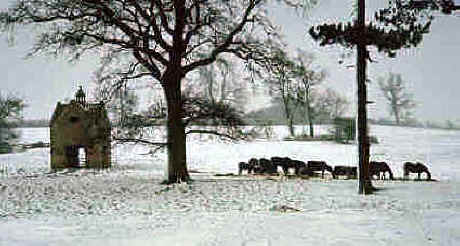
 Southwest tacked to the wall above the desk. The desk-table, one of
those sturdy, solid oak types that had leaves at each end that
pulled out and locked in position, was covered in orderly chaos with
books, manuscripts, letters and papers. The portable typewriter
rested on a small table adjacent. More books and boxes of note cards
and photocopied materials were stacked on the floor nearby.
Southwest tacked to the wall above the desk. The desk-table, one of
those sturdy, solid oak types that had leaves at each end that
pulled out and locked in position, was covered in orderly chaos with
books, manuscripts, letters and papers. The portable typewriter
rested on a small table adjacent. More books and boxes of note cards
and photocopied materials were stacked on the floor nearby.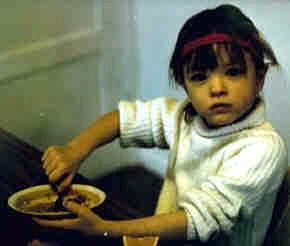 large enough for a sizable farm family. From the time the girls
threw back their bed covers each morning, they were drawn like
magnets to the kitchen. There was no heat in the bedrooms, and the
scant warmth of the bathroom did not slow their progress to the
kitchen, on cold days the very heart of the house. The big,
cast-iron, oil-fired Raeburn cooking stove was never turned off.
large enough for a sizable farm family. From the time the girls
threw back their bed covers each morning, they were drawn like
magnets to the kitchen. There was no heat in the bedrooms, and the
scant warmth of the bathroom did not slow their progress to the
kitchen, on cold days the very heart of the house. The big,
cast-iron, oil-fired Raeburn cooking stove was never turned off.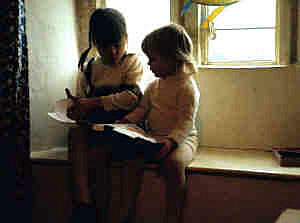 goodbye at the head of the stairs and went into my bedroom. A few
minutes later, I heard a shouted goodbye from outside and went to the
window. I opened it and waved to Cary. She waved, closed the gate
and set off down the driveway. The short driveway led to the road,
"the bumpy road," the girls called it, that ran about two
hundred yards to the paved lane, almost obscured by trees and
hedges.
goodbye at the head of the stairs and went into my bedroom. A few
minutes later, I heard a shouted goodbye from outside and went to the
window. I opened it and waved to Cary. She waved, closed the gate
and set off down the driveway. The short driveway led to the road,
"the bumpy road," the girls called it, that ran about two
hundred yards to the paved lane, almost obscured by trees and
hedges.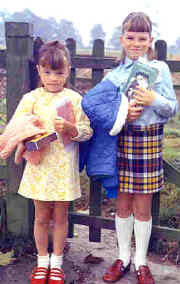 A
slammed door, hurried footsteps on the paving stones below. Merrilee
rushed through the gate, looked up and waved, dropped her books,
closed the gate, gathered up the books and flew down the road, coat
open and flapping. She caught up with Cary about fifty yards from
the paved lane and they walked the rest of the way together. They
crossed the cattle guard and waited there, blue and red dots in a
silver-gray landscape.
A
slammed door, hurried footsteps on the paving stones below. Merrilee
rushed through the gate, looked up and waved, dropped her books,
closed the gate, gathered up the books and flew down the road, coat
open and flapping. She caught up with Cary about fifty yards from
the paved lane and they walked the rest of the way together. They
crossed the cattle guard and waited there, blue and red dots in a
silver-gray landscape.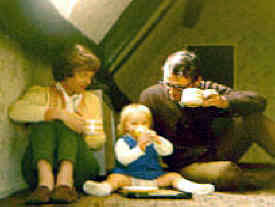 swallows
of hot chocolate and mouthfuls of bun. Carol explained, carefully
adding to Jennifer's story rather than translating. Their walk this
morning had taken them to the pasture beyond the barn where they had
seen four new lambs. They had watched the tiny lambs frolicking like
kittens. Jennifer had touched one of the new lambs that Mr. Haworth,
our landlord, brought to her.
swallows
of hot chocolate and mouthfuls of bun. Carol explained, carefully
adding to Jennifer's story rather than translating. Their walk this
morning had taken them to the pasture beyond the barn where they had
seen four new lambs. They had watched the tiny lambs frolicking like
kittens. Jennifer had touched one of the new lambs that Mr. Haworth,
our landlord, brought to her. minute our gray-green world was splashed with color. What
magnificent horses and beautiful, smartly-dressed people, filling
the grassy lane and the bumpy road and even our driveway. Jennifer
jumped up and down, squeezed my hand and jabbered loudly.
minute our gray-green world was splashed with color. What
magnificent horses and beautiful, smartly-dressed people, filling
the grassy lane and the bumpy road and even our driveway. Jennifer
jumped up and down, squeezed my hand and jabbered loudly.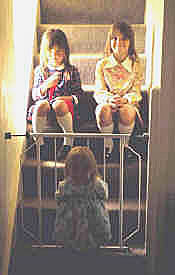 on the top step and Merrilee on the deep sill of the small stairwell
window. Carol set the tray on the floor in the gable window's light,
and we sat on opposite sides of it. She poured our tea and told me
about her afternoon.
on the top step and Merrilee on the deep sill of the small stairwell
window. Carol set the tray on the floor in the gable window's light,
and we sat on opposite sides of it. She poured our tea and told me
about her afternoon.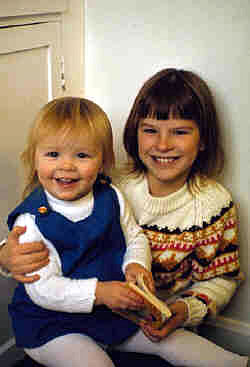 lifted Cary over the barrier and wondered, as I had wondered scores
of times, whether I could do a flatfooted leap over it. I decided,
as I had decided as many times, that I would not risk a broken jaw
on the stone floor by trying. I climbed over, swept up Jen who was
already jabbering to Cary, and we all went into the kitchen.
lifted Cary over the barrier and wondered, as I had wondered scores
of times, whether I could do a flatfooted leap over it. I decided,
as I had decided as many times, that I would not risk a broken jaw
on the stone floor by trying. I climbed over, swept up Jen who was
already jabbering to Cary, and we all went into the kitchen.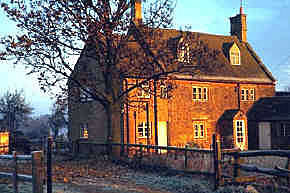 The
slanting rays of the evening sun cast long shadows and bathed the
front of the house. The rich, cream-colored Cotswold stone glowed. I
sat on the bench, stretched out my legs, and closed my eyes. The sun
warmed my face ever so slightly. A bird sang in the distance. I
opened my eyes to see the sun touch the horizon, golden through the
leafless trees and silhouetting Chastleton House, making it seem
larger than it was. Carol looked up from her writing pad and
watched. The sun dropped quickly, changing color from gold to
orange, and it was gone.
The
slanting rays of the evening sun cast long shadows and bathed the
front of the house. The rich, cream-colored Cotswold stone glowed. I
sat on the bench, stretched out my legs, and closed my eyes. The sun
warmed my face ever so slightly. A bird sang in the distance. I
opened my eyes to see the sun touch the horizon, golden through the
leafless trees and silhouetting Chastleton House, making it seem
larger than it was. Carol looked up from her writing pad and
watched. The sun dropped quickly, changing color from gold to
orange, and it was gone.